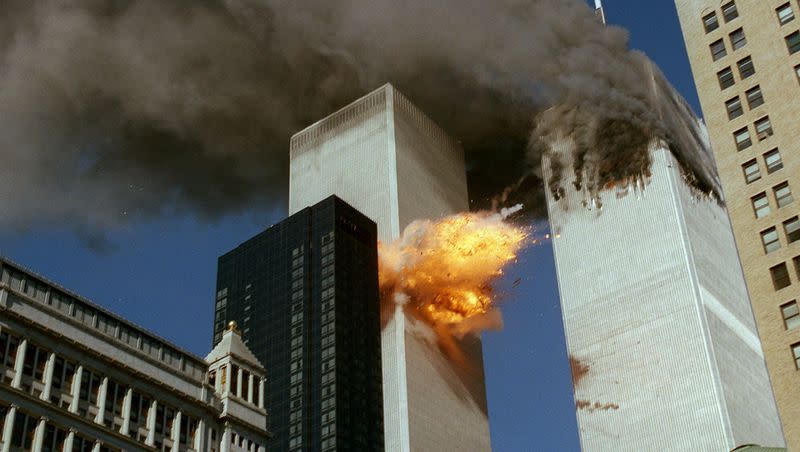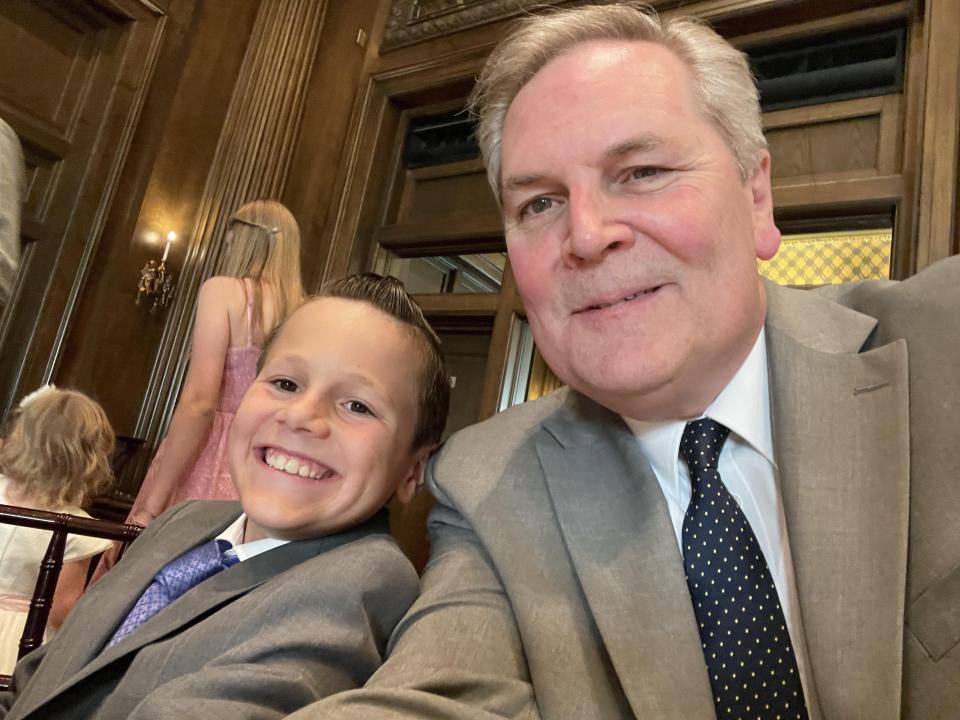My grandson called me: ‘Can I interview you about 9/11?’

At 8:46 a.m. in New York City, Flight 11 from Boston, originally bound for Los Angeles, slammed into the World Trade Center’s north tower. All onboard the Sept. 11, 2001, flight were instantly killed and World Trade Center employees were trapped above the 91st floor. Across America — from east to west — we awakened to the terrorist attack in every way possible.
Sometime after 6 a.m. in Northern California, I was up and headed to the car to drive my eldest daughter to a Latter-day Saint seminary class. Our first notice of a changed world came through the car radio; a plane hit the tower. We just didn’t know how much it would change as both towers eventually came down.
As a newspaperman, I quickly returned home and raced into the office to help produce a special edition of this evolving tragedy. But this isn’t a column about my remembrances of 9/11, more than two decades after the event. This is about a phone call with my 11-year-old grandson — the eldest son of that daughter I was with en route to seminary.
“Grandpa, can we set up a time so I can interview you about 9/11?”
There are official documents and timelines. You can read the 9/11 Commission report with its headings that include, “The Foundation of the New Terrorism,” and “Responses to Al Qaeda’s Initial Assaults.” But there is perhaps a greater responsibility to pass on the stories of 9/11 to each generation: What it meant at the time. Why we put flags and ribbons on our car antennas. What patriotism meant in the moment. What we felt about threat and war and our personal safety.
There are stories from those directly impacted, the families who lost loved ones and share their stories of pain and suffering, but also compassion and kindness. But all of us of a certain age could see the changes that occurred from pre-attack to post-attack, the same way I as a child interviewed my own mother and grandmother about their remembrances of the attack on Pearl Harbor.
Related
Where were you when the 9/11 attack happened? came the first question from Jackson.
I shared the same story of being with his mother, then a young teenager, listening on the radio. We were far away from the actual attack sites. We wondered if she should still go to seminary and school. But it was still early. In a later call, I asked Jackson’s mother what she remembers from that morning.
“It colored my adulthood,” she said. “It was a hugely impactful day when our nation was attacked. It was one of those times when war felt close to me ... something on our own soil. ... So I looked to my parents and teachers to learn how I was supposed to be feeling about that. So now Jackson is trying to understand what he should feel about it.”
Next questions:
How did you physically and emotionally react to it?
Did you know anyone who lost their life?
How did Sept. 11 affect your patriotism or your overall view of the United States?
Why do you think the terrorists chose to attack the World Trade Center?

Each question brought a short discussion. We talked about the desire to fly the flag, even from our car, and the unity the country felt. We discussed the symbols of America, in this case what the twin towers represented to the world, and why the terrorists would believe that attacking the towers and the Pentagon would be hitting at the heart of America, if not the heartland.
The conversation turned from school assignment to two family members talking to each other. He asked, “Do you think this type of attack could happen again?”
What do you say to a sixth grader, full of joy and yet to be beaten down by the vicissitudes of life? I want him to go through school happy and with love for the possibility of what lies ahead.
I responded, something could happen again, but we try to prepare in a way to make it much less likely. And to prepare ourselves to know how to keep our values intact, while helping others who may be struggling.
His mother, Sydney, in that separate conversation with me, talked about her desire to arm her children with appropriate knowledge and perspective to meet the challenges ahead.
“I think knowledge is power. I really do believe that,” she said. “Helping children have an understanding helps them lose some of the fear.” She then brought up what she thinks about.
“In the same way there are school shootings today, we try to address it, we talk about ways to protect themselves.” That means going through the unlikelihood that it will happen, but also helping children understand safety measures at school. She discussed reinforcing the values the family has, knowing that that will provide them strength, comfort and support.
Establishing and maintaining one’s values, together with preparation, help us endure the storm. Jackson and I each gained some clarity about that through this school assignment.
Final question: Grandpa, why do you think it takes an attack (I think he said tragedy) to bring people together?
I said I wish it didn’t. But when there is common purpose, a common goal, we can work together to find solutions to difficult problems. And we can think of others at those times more than ourselves.
“I wish it could be like that without a tragedy,” he said.
I do too, Jack. I do too.
Doug Wilks is executive editor of the Deseret News.

